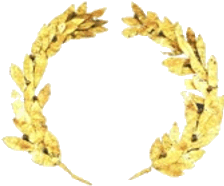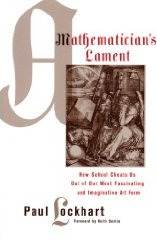
Buch des Jahres 2009

Paul Lockhart: A Mathematican's Lament; How School cheats us out of our most fascinating and imaginative art form; Bellevue Literary Press
Mein Amerikabesuch im Oktober 2009 hatte u.a. drei schöne Erkenntnisse zur Folge:
- , dass es an der Ostküste im hinterletzten Kaff Buchhandlungen gibt, die schon allein im Fach Mathematik ein gigantisches Angebot haben,
- , dass "die" AmerikanerInnen sehr viel weniger Angst vor Pupulärwissenschaften haben,
- , dass ich problemlos englischsprachige Mathebücher lesen kann, also nicht mehr darauf angewiesen bin, auf die deutschen Übersetzungen zu warten - wenn sie denn überhaupt erscheinen.
Weil es also leichtverständliche englischsprachige Mathebücher gibt, erlaube ich mir ab sofort, einige in
![]() vorzustellen.
vorzustellen.
Wenn "kleine" Lehrer wie Victor Habermann
oder ich rabiat die derzeitige Bildungspolitik, aber auch das Verständnis des Faches Mathematik kritisieren, bleibt das wohl (schnief!) weitgehend ungehört
("[Es wäre] Eine kleine Sensation: Ein Lehrer, den man fragt, was er vom Bildungswesen hält. Wow."
[Frank McCourt]),
kann aber auch der Eindruck aufkommen, die Kritik gelte (wenn überhaupt) nur regional, d.h. in einem bestimmten Bundesland oder aber der Bundesrepublik Deutschland.
In dem Buch
 wird nun aber deutlich, dass das Problem weltweit existiert, wenn Lockhart auch mit "states" vermutlich nur die US-Bundesstaaten meint:
wird nun aber deutlich, dass das Problem weltweit existiert, wenn Lockhart auch mit "states" vermutlich nur die US-Bundesstaaten meint:
"The most striking thing about this so-called mathematics curriculum is its rigidity. [...]From school to school, city to city, and state to state, the same exact things are being said and done in the same exact way and in the same exact order."
Kommt hinzu, dass ein in einem "richtigen" Verlag publiziertes Buch, das zudem noch aus dem "Empire State" USA kommt, vermutlich "bedeutsamer" wirkt.
Man muss das Buch nicht mal umständlich in den USA bestellen, sondern es ist auch als PDF-Datei unter
![]() erhältlich.
erhältlich.
Im Folgenden die meiner Meinung nach wichtigsten Zitate:
- "Everyone knows that something is wrong [in contemporary mathematics education]. The politicians say, “we need higher standards.” The schools say, “we need more money and equipment.” Educators say one thing, and teachers say another. They are all wrong. The only people who understand what is going on are the ones most often blamed and least often heard: the students. They say, “math class is stupid and boring,” and they are right."
- "By concentrating on what, and leaving out why, mathematics is reduced to an empty shell. The art is not in the “truth” but in the explanation, the argument. It is the argument itself which gives the truth its context, and determines what is really being said and meant. Mathematics is the art of explanation. If you deny students the opportunity to engage in this activity - to pose their own problems, make their own conjectures and discoveries, to be wrong, to be creatively frustrated, to have an inspiration, and to cobble together their own explanations and proofs - you deny them mathematics itself. So no, I’m not complaining about the presence of facts and formulas in our mathematics classes, I’m complaining about the lack of mathematics in our mathematics classes."
- "SIMPLICIO: But don’t you think that if math class were made more like art class that a lot of kids just wouldn’t learn anything?
SALVIATI: They’re not learning anything now! Better to not have math classes at all than to do what is currently being done. At least some people might have a chance to discover something beautiful on their own.
SIMPLICIO: So you would remove mathematics from the school curriculum?
SALVIATI: The mathematics has already been removed! The only question is what to do with the vapid, hollow shell that remains. Of course I
would prefer to replace it with an active and joyful engagement with mathematical ideas.
SIMPLICIO: But how many math teachers know enough about their subject to teach it that way?
SALVIATI: Very few. And that’s just the tip of the iceberg…"
[Und da sei schon ergänzt: das Hauptproblem besteht darin, dass viele Mathe-LehrerInnen (ich inklusive?) auch nur ein höchst eingeschränktes Verständnis der Mathematik haben: Lockhart Verständnis von Mathematik, das er an einigen Beispielen vorführt
(denn das Buch ist ja keineswegs nur - wie der Titel androht - ein "Lament[ieren]" ),
ist nämlich eine erhebliche Herausforderung!]
- "There is surely no more reliable way to kill enthusiasm and interest in a subject than to make it a mandatory part of the school curriculum. Include it as a major component of standardized testing and you virtually guarantee that the education establishment will suck the life out of it. School boards do not understand what math is, neither do educators, textbook authors, publishing companies, and sadly, neither do most of our math teachers."
- "So put away your lesson plans and your overhead projectors, your full-color textbook abominations, your CD-ROMs and the whole rest of the traveling circus freak show of contemporary education, and simply do mathematics with your students!"
- "The truly painful thing about the way mathematics is taught in school is not what is missing - the fact that there is no actual mathematics being done in our mathematics classes - but what is there in its place: the confused heap of destructive disinformation known as “the mathematics curriculum.”"
- "In practice, the curriculum is not even so much a sequence of topics, or ideas, as it is a sequence of notations. Apparently mathematics consists of a secret list of mystical symbols and
rules for their manipulation. Young children are given ‘+’ and ‘÷.’ Only later can they be entrusted with ‘√¯,’ and then ‘x’ and ‘y’ and the alchemy of parentheses. Finally, they are indoctrinated in the use of ‘sin,’ ‘log,’ ‘f(x),’ and if they are deemed worthy, ‘d’ and ‘∫.’ All without having had a single meaningful mathematical experience.
This program is so firmly fixed in place that teachers and textbook authors can reliably predict, years in advance, exactly what students will be doing, down to the very page of exercises. It is not at all uncommon to find second-year algebra students being asked to calculate [ f(x + h) – f(x) ] / h for various functions f, so that they will have “seen” this when they take calculus a few years later. Naturally no motivation is given (nor expected) for why such a seemingly random combination of operations would be of interest, although I’m sure there are many teachers who try to explain what such a thing might mean, and think they are doing their students a favor, when in fact to them it is just one more boring math problem to be gotten over with. “What do they want me to do? Oh, just plug it in? OK.”" - "SIMPLICIO: [...] Surely teaching methods have improved since then.
SALVIATI: You mean training methods. Teaching is a messy human relationship; it does not require a method. Or rather I should say, if you need a method you’re probably not a very good teacher. If you don’t have enough of a feeling for your subject to be able to talk about it in your own voice, in a natural and spontaneous way, how well could you understand it? And speaking of being stuck in the nineteenth century, isn’t it shocking how the curriculum itself is stuck in the seventeenth? To think of all the amazing discoveries and profound revolutions in mathematical thought that have occurred in the last three centuries! There is no more mention of these than if they had never happened.
SIMPLICIO: But aren’t you asking an awful lot from our math teachers? You expect them to provide individual attention to dozens of students, guiding them on their own paths toward discovery and enlightenment, and to be up on recent mathematical history as well?
SALVIATI: Do you expect your art teacher to be able to give you individualized, knowledgeable advice about your painting? Do you expect her to know anything about the last three hundred years of art history? But seriously, I don’t expect anything of the kind, I only wish it were so.
SIMPLICIO: So you blame the math teachers?
SALVIATI: No, I blame the culture that produces them. The poor devils are trying their best, and are only doing what they’ve been trained to do. I’m sure most of them love their students and hate what they are being forced to put them through. They know in their hearts that it is meaningless and degrading. They can sense that they have been made cogs in a great soul-crushing machine, but they lack the perspective needed to understand it, or to fight against it. They only know they have to get the students “ready for next year.” - "The cultural problem is a self-perpetuating monster: students learn about math from their teachers, and teachers learn about it from their teachers, so this lack of understanding and appreciation for mathematics in our culture replicates itself indefinitely. Worse, the perpetuation of this “pseudo-mathematics,” this emphasis on the accurate yet mindless manipulation of symbols, creates its own culture and its own set of values. Those who have become adept at it derive a great deal of self-esteem from their success. The last thing they want to hear is that math is really about raw creativity and aesthetic sensitivity."
- "Now there is a place for formal proof in mathematics, no question. But that place is not a student’s first introduction to mathematical argument. At least let people get familiar with some mathematical objects, and learn what to expect from them, before you start formalizing everything. Rigorous formal proof only becomes important when there is a crisis— when you discover that your imaginary objects behave in a counterintuitive way; when there is a paradox of some kind. But such excessive preventative hygiene is completely unnecessary here - nobody’s gotten sick yet! Of course if a logical crisis should arise at some point, then obviously it should be investigated, and the argument made more clear, but that process can be carried out intuitively and informally as well. In fact it is the soul of mathematics to carry out such a dialogue with one’s own proof. So not only are most kids utterly confused by this pedantry - nothing is more mystifying than a proof of the obvious - but even those few whose intuition remains intact must then retranslate their excellent, beautiful ideas back into this absurd hieroglyphic framework in order for their teacher to call it “correct.” The teacher then flatters himself that he is somehow sharpening his students’ minds."
- "Students need to be able to make their own definitions as the need arises - to frame the debate themselves. I don’t want students saying, “the definition, the theorem, the proof,” I want them saying, “my definition, my theorem, my proof.”"
- "Efficiency and economy simply do not make good pedagogy."
 )
)